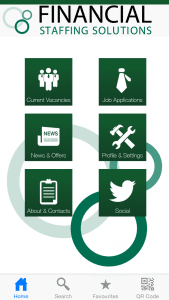18 Feb / 2015
Marketing Yourself and Your Accounting Business
Career Tips and Business Ideas for Finance and Accounting Professionals – here’s our latest round-up of great reads sourced from around the web. Whether you’re looking to market your accountancy practice or embark on a job search, there’s something here for you.
First up, a couple of great posts for anyone keen to raise the profile of their accounting practice and generate more referral business and sales leads. Replace the word “Consulting” in this first post with “Accountancy” and you’ve got some great insights on actionable steps for your business:
Is Your Consulting Firm Top of Mind?
In a similar vein, intriguing ideas here on how changing the way you describe your services and the impact they will have on clients can dramatically improve the new business wins you bring in:
Marketing Tip: Sell them ideas!
And last but not least – an excellent write-up from a former recruiter about working effectively with a recruitment agency to secure your next career move:
How to make recruiters work for you: be punctual, serious and respectful
Of course if you’re toying with a career move, feel free to call us and we’d be delighted to help.
Whether your goal is to attract more clients to your accounting business or to secure a new role in the financial industry, you can further your career and achieve your goals by better leveraging digital and social channels.
How? Try following our simple steps to stand out from the crowd – whether that be competing businesses or other jobseekers.
Step 1 – Ensure you can be found
The most important step in becoming more digitally savvy is to make sure you can be found online.
If you want to be head-hunted by financial recruiters, or you would like your accountancy practice to be found by prospective clients, they must be able to find you to begin with.
With millions of websites and social profiles online it can be easy to get lost amongst them.
One of the first things to consider is what keywords are recruiters and prospective clients going to search for when looking for candidates/business partners? Brainstorm possible keywords and then incorporate them into your Social Profiles/ Blog / Business Website. For example, a candidate might target keywords a recruiter may use for a specific role: eg. Chartered Accountant London – and then look to expand on the skills and experience related keywords that might relate to such a position (hint: search in related job adverts to find ideas for suitable keywords, they’ll stand out as the things recruiters are looking for in that hire)
You should look to pepper these target keywords in places such as your LinkedIn headline, job titles, summary, skills section and descriptions of your current and previous roles. Ideally take this a step further and incorporate them into other social profiles such as Twitter and Google+.
For a prospective client searching for a practice, their target keywords may be: Small Accountancy Firm London. Add these keywords throughout your website: page titles, various web pages, meta titles and descriptions. Although it is important to add these keywords throughout your entire website, please be mindful that it must read naturally. Also include these in your social profiles, as often your profiles may actually rank higher on Google than your SME website.
This task is a must to ensure you are found online, because many recruiters and prospective clients will begin their search on Google or on LinkedIn
Step 2 – Ensure your story is compelling
Now that you have mastered how to drive recruiters / prospective clients to your online presence, it is imperative that what they see there inspires them.
There is no point driving traffic to your Social Profile / Website only for them to be disappointed and leave straight away. Make sure that once they find you, they want to contact you.
With regards to Social Profiles, that means writing compelling summaries focused on your achievements, adding past project examples, and sharing interesting financial content to engage with like-minded professionals.
Similarly, with your practice’s website you must ensure that your website is user friendly, easy to navigate and gets your business’s message across simply. What services do you offer? For what sort of clients? Do you have testimonials from satisfied customers? Are your contact details easy to find and do you offer several different ways for people to get in touch? If your practice’s message is unclear and the website is complicated to use, prospective clients are going to leave in search of a better website and in turn, another practice.
Step 3 – Become a thought leader
You have now successfully driven recruiters and / or prospective clients to your Social Profile / Website and got them to the point where they are interested in you. Now it is time to show off your expertise.
One of the best ways to highlight your experience and knowledge within your niche sector is to create relevant content and share it.
Ensure that you have a compelling blog with interesting feature articles and facts and figures about the financial industry, anything you know prospective clients or employers will find informative to read. Create this all on your website or publish on your LinkedIn profile. This may sound time consuming, but not all the posts have to be that long and they could just be you offering some thoughts or insights on some of the latest financial news.
With regards to looking for work, publish content on your LinkedIn profile, share updates with your LinkedIn network, contribute to other financial industry blogs or indeed start your own.
Creating your own content will highlight your expertise within your niche and help you secure a new job, or work with a new client. By creating insightful content within the financial sector you take the steps to becoming a thought leader and building professional credibility for yourself.
Step 4 – Build your influence & visibility
Lastly, you need to ensure all your social profiles are complete and updated regularly.
By now you have a website / social profiles that are optimised to be found for target keywords and they are filled with compelling content proving you to be a thought leader within the Financial industry. This is all fantastic, but you must also remember the power of Social Media.
Social Media platforms are a great way to create a network of contacts within your niche. Use your Social Profiles to share relevant financial news, your own content, reshare interesting updates, comment on other people’s posts / updates and get in front of the top influencers in the Financial industry. Follow people that you find interesting, and chances are if they see that you’re sharing content that is relevant to them they’ll follow back.
Once you have built a strong brand on Social Media you can successfully put yourself and / or your practice in front of many people within your industry and if an influencer shares your updates, the door will open to many more opportunities. So log onto your Social Media Platforms and get tweeting, liking and linking. It’s more integral to your career success than ever before.
Are you thinking of changing jobs this coming year? If so, be sure to download our app for Android or iPhone today.
Finance and Accounting insights – here’s our latest round-up of great reads sourced from around the web. If you’re pursuing a career in Finance and Accounting hope you find these interesting. If you’re toying with a career move, feel free to call us if you’d like to discuss your next career move.
George Osborne’s Autumn Statement is dissected by Tax Research UK:
What Osborne forgot to say: austerity does not guarantee the government balances its books
And two announcements designed to combat international tax avoidance are examined: AS 2014: Crackdown on hybrids and diverting profits
While elsewhere the QuickBooks blog looks at startups and the areas of a startup’s budget where cutting corners is never a smart idea:
18 Nov / 2014
Finance & Accounting Candidate Insights
Here’s our round-up of great candidate reads from around the web, for anyone pursuing a career in Finance and Accounting.
Has your finance career stalled? Are you seeing the career progression you would like in your current role? Here are steps you can take to get your career moving forward again (or alternatively call us to pursue other opportunities):
Ever applied for a role that looked perfect – and yet your application didn’t even secure you an interview? Here are a few reasons your application might have been overlooked, and what you can do to make sure your next one stands out:
3 Reasons Overqualified Candidates Don’t Get Job Offers
The London jobs market has rebounded – so now’s a great time to start looking at your career options. Some quick insights about how well the finance sector jobs market is doing:
15 Aug / 2014
Guide to Annual Holiday Entitlement
Guide to Annual Holiday Entitlement.
Annual leave entitlements should be agreed when an employee starts work, details of holidays and holiday pay should be found in the employee’s written statement or contract of employment.
key points
• Most workers are legally entitled to 5.6 weeks paid holiday per year (this is known as statutory entitlement).
• Part time worker are entitled to the same amount of holiday (pro rota) as full time colleagues.
• Employers can set the times when workers can take their leave – for example a Christmas shut down.
• If employment ends workers have the right to be paid for any leave due but not taken.
• There is no legal right to paid public holidays.
•
Once an employee starts work details of holidays and holiday pay entitlement should be found in the employee’s written contract, where there is one, or a written statement of employment particulars given to employees by their employer.
Note: The written statement is required by law and must be given to employees by the employer no later than two months after the start of employment.
Additional annual leave may be agreed as part of a worker’s contract. A week of leave should allow workers to be away from work for a week – i.e. it should be the same amount of time as the working week. If a worker does a five-day week, he or she is entitled to 28 days leave. However, for a worker who works 6 days a week the statutory entitlement is capped at 28 days. If they work a three-day week, the entitlement is 16.8 days leave. Employers can set the times that workers take their leave, for example for a Christmas shut down. If a worker’s employment ends, they have a right to be paid for the leave due and not taken.
Public holidays
There is no legal right to paid leave for public holidays; any right to paid time off for these holidays depends on the terms of a worker’s contract. Paid public holidays can be counted as part of the statutory 5.6 weeks of holiday.
Carrying leave over from one leave year to the next
Workers must take at least four weeks statutory leave, they may be able to carry over the remaining leave if their employer agrees. Workers do not have an automatic right to carry leave over to the next holiday year.
This information was supplied by Acas
21 Jul / 2014
Financial Staffing Solutions App

This App can be downloaded onto your iPhone, Tablet or Android phone. It’s packed with our latest jobs which you can apply for via the App. Latest market news and salary surveys and our must read blog. All of which you will be able to access anywhere you have an internet connection on your device.
You can download the App free of charge using the links or QR code below.
The App is completely free, download it and you can start look for new career opportunities.
The Financial Staffing Solutions app makes it easier for you to find your next accountancy or finance position. Developed especially for mobile or tablet platforms our “job push” function allows you to apply to a vacancy as soon as it goes live.
Financial Staffing Solutions is a leading finance & accountancy recruitment agency covering positions throughout London and the South East.
Our app will forward our latest jobs, give you the opportunity to upload your CV, track your application and get advice via our blog, tips and salary surveys all by the tap of a finger.
Specialising in Accountancy and Finance roles ranging from bookkeepers to qualified Finance Directors, we take pride in treating each applicant as an individual. Supporting the talented and ambitious with introductions to the very best career opportunities, as well as providing guidance and support throughout the selection process.
Offering unique job opportunities and providing advice, ranging from CV presentation to interview techniques, our approach ensures you have the best team behind you to help make that important career move.
We are always pleased to hear from people who looking for a new career opportunity.
26 May / 2014
Meet Darren – our new recruit!
We’re delighted to welcome Darren Hymos to our head office team!
Darren joins us with a strong financial background – 28 years’ experience, mainly in corporate roles including both sales and management. So he’s perfectly placed to understand your financial recruitment needs.

Within a broad range of relevant qualifications, Darren holds various chartered business and finance diplomas from his corporate days. He’s highly skilled at helping businesses to reach their potential, and this is an area of his expertise that he’ll transfer to helping jobseekers achieve their dream roles.
Outside of office hours, Darren enjoys playing football, golf, squash and boxing – with several shiny trophies to boast about! He’s also a talented musician, gaining singing and trumpet awards from the Royal Academy of Music. And to top it off, he enjoys cooking! But don’t expect a three course meal when you call in for your interview – although you can expect to see a jar of jelly sweets on his desk if you visit our Chigwell office – he can’t resist them!
Darren’s a fantastic financial mind, a brilliant advisor and an exceptional father. What more could we ask of our new recruitment consultant?!
16 May / 2014
Celebrating your key strengths – interview success!

- How would you describe yourself?
Show your passion for your work. Describe yourself from a business perspective so the interviewer can feed off your enthusiasm. Focusing on your employment skills gives you the chance to show off the traits they’re looking for without taking it to a personal level. - How would your colleagues describe you?
This is especially good if you’re shy about blowing your own trumpet. You can raise the key points of honesty, efficiency and a hard working ethic without feeling embarrassed. - Why do you think you’ll fit into our company?
Having researched the firm, apply your strong personal skills to what you’ve learned about them.
Remember throughout that you need to build rapport with your interviewer. Demonstrating your enthusiasm for your work and the company will create a memorable bond that can score you interview points. Give tangible examples of your knowledge and/or experience, show that you’re genuinely interested in working there, and – very importantly – smile! We’re always happy to offer advice on interview skills – call us before the big day on 020 8532 2644
29 Apr / 2014
A head start amongst candidates

This is your opportunity to show the interviewer how enthusiastic you are! Show them that you love the sound of the job, you’re interested in the company and you can’t wait to work there! Any potential employer wants to see how excited you are about the prospect of joining their firm. So give them what they want to see!!
The truth is, other candidates probably have similar financial skills and accounting experience to you – so you need to really set yourself apart. And a great way to do that is to gather as much knowledge about the firm as you possibly can.
Do your homework before the interview so that you’re really clued up. Then you can confidently demonstrate that you’ve researched the company – and the relevant department, if possible. Show an understanding of its strategy, structure, history and how it’s currently performing. Tell them how much you love their products or can relate to the services they offer.
Other candidates might not have bothered to prepare themselves well, so you can shine using your knowledge of what the company offers. And when asked what you can do that others can’t, you’ll be able to relate your financial skills and experience to the insightful company knowledge you’ve already gained.
Enthusiasm is contagious! If you can speak about the company with authority as well as showing that you really can’t wait to join, your passion will certainly impress them.
If you’re not sure how to relate your skills and experience to a new position, ask us about interview prep advice… Email info@staffingsolutions.co.uk.
16 Apr / 2014
The three most important interview questions…
There are three key things an interviewer wants to establish. If you can master your answers to these questions, you’re half way to landing the job!
1. Why should we hire you?
This is your opportunity to demonstrate that you have the skills, expertise and experience to perform the job.
2. What can you do for us that other candidates can’t?
Show your enthusiasm for the job and your interest in working for that particular company.
3. What are your key strengths and weaknesses?
Let the interviewer see how well you would fit into the team, culture and company.
This blog focuses on the first question – why the company should hire YOU rather than someone else!
When asked why the company should hire you, you must show them that you have the skills, expertise and experience to carry out the job you’ve applied for.
Think about how your experience and skills (including transferable skills) tie in with the job description. Start with any specific or technical skills that the role requires and give examples of how you have tackled similar tasks. This is your chance to let them see that you CAN do this job – and do it well.
If you don’t have relevant experience but can demonstrate that you’ve done something similar and you’re competent to learn quickly, that’s fine too. This is your chance to explain why you can do the job as well as – or better than – the next candidate.
Next, consider the general skills that make a good team player, such as communicating well, being competent on the computer and so on. Focusing about these points that everyone can relate to will stop you from getting sidetracked into talking about things that are not relevant.
Relate back to these key skills and your own experience when answering questions about yourself. These examples will help to get you started…
- Tell me about yourself?
Tell them why you enjoy this kind of work.
“I’m passionate about…” “I’ve always loved working with….” - What are your greatest strengths / weaknesses?
Focusing on your work experience is less daunting than simply discussing your personal strengths.
“I successfully completed project X because I’m tenacious, motivated and work to deadline.” - What can you do for us that other candidates can’t?
Don’t be shy! This is your chance to shine.
“In my last role, I implemented new systems that have proven beneficial to the whole team…” - Why do you think you are right for this job?
Why do you?? Make sure you have an answer prepared.
“I have the expertise you need to hit the ground running…” “My experience has proven I can do this job well, and I’m quick to learn new systems…” - What do you think the main challenges will be?
All jobs come with challenges; don’t be blasé, but end on a positive note.
“Adapting to your systems, but I’m sure I’ll pick things up quickly…”
Next blog: what can you do for us that other candidates can’t?






